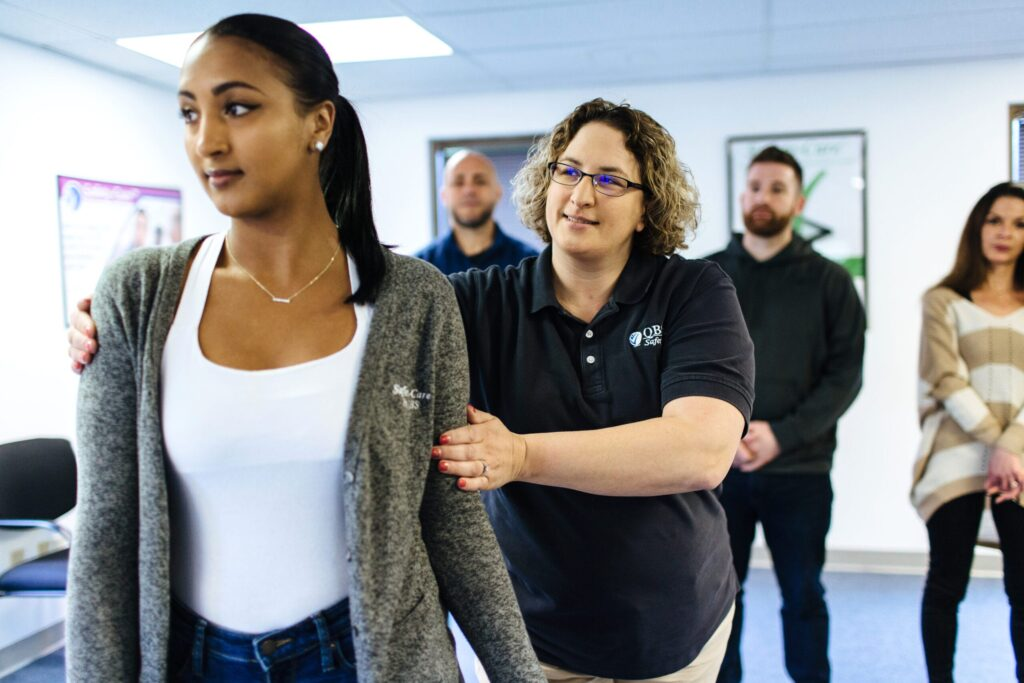.png?width=88&height=95&name=Group%20137%20(5).png)


How to Implement Safety-Care?
-
Register for a Safety-Care Trainer class or call us to request a closed session for your organization. We regularly conduct classes in all 50 states and Canada.
-
Complete your class to become a certified Safety-Care Trainer for your organization. We bring you to fluency using an errorless teaching methodology.
-
You train and certify your staff in Safety-Care’s effective techniques.
-
Our Master Trainers are available by phone, email, or video to help your organization with any questions or concerns while using or implementing Safety-Care.

Legal Requirements
|
Summary and Safety-Care Alignment: Effective: July 9, 2021 Last Updated: December, 2024 In 2021, Rhode Island passed Senate Bill 55 which set new requirements regarding workplace safety in hospitals. Below is a summary as well as information on how Safety-Care can help meet the training needs of staff. How Safety-Care aligns: Numerous health care organizations throughout the United States and Canada rely upon QBS and our Safety-Care training to provide their staff members with the training they need to help maintain a safe and healthy environment. Safety-Care provides a comprehensive, supportive approach to incident prevention, de-escalation, and management. Your Staff will learn practical strategies for helping students that use evidence-based practices consistent with PBIS (Positive Behavior Interventions and Supports) and ABA (Applied Behavior Analysis). |
|
23-17.28-5. Safety assessments - preventive programs (1) Create a workplace safety committee which shall conduct periodic security and safety assessments to identify existing or potential hazards for assaults committed against employees; |
|
(b) An assessment conducted under subsection (a)(1) of this section shall include, but need not be limited to: (1) Keeping track of the frequency of assaults committed against employees that occur on the premises of the hospital; and |
|
(d) Assault prevention and protection training required under subsection (a)(3) of this section shall address the following topics: (1) General safety and personal safety procedures; (i) The amount of physical force that is reasonably necessary to protect the employee or a third person from assault; and (9) Procedures for documenting and reporting incidents involving assaultive behaviors; How Safety-Care aligns: Safety-Care as a training program can be tailored to meet the needs of multiply organizations and professions. All Safety-Care offerings are trauma-informed and utilize PBIS and ABA to ensure that all trainees are equipped with the appropriate responses to challenging behaviors. Additionally, add-on trainings can be provided for unique situations to your facility. Safety-Care is initially taught over a three day period and requires renewal courses once a year. Our program is also under constant evaluation to ensure that it matches with the most current research in de-escalation, positive behavior reinforcements, and safety protocols. Safety-Care is primarily taught through verbal and role-play methods to ensure that trainees have hands on experience with the physical management techniques that are used. As part of our focus on de-escalation, Safety-Care uses a “De-Escalation Staircase” format. This staircase is used to describe how an individual can move up and down from a state of calm to a state of crisis, where violence is possible. As part of the discussion on the staircase, behavioral predictors are reviewed. Safety-Care strategies can then be used to move an individual down the staircase back to a state of calm. |
|
(e) Hospitals shall provide assault prevention and protection training to a new employee within ninety (90) days of the employee’s initial hiring date. |
|
(g) At least once every two (2) years, a hospital shall establish, in coordination with the hospital’s workplace safety committee, a process by which the committee shall review the hospital’s assault prevention and protection program developed and implemented under subsection (a)(2) of this section in order to evaluate the efficacy of the program and consider any changes to the program. |
Why Safety-Care?
Benefits & Differentiators
In addition to Safety-Care being highly cost-effective, you get:

Skills to effectively prevent, minimize, & manage behavioral challenges with dignity, safety, & the possibility of change

Decreases in staff and patient injuries and reduction in restraint & seclusion time

Instructional procedures based on decades of evidence-based research & compatible with ABA, PBIS & reinforcement-based environments

Customizable program for your setting, staff & clientele, with a strong focus on preventative via non-intrusive, replacement behaviors

Extremely rigorous standards grounded in errorless teaching methodology

Small, intimate class sizes backed by unlimited support & resources
How Is Safety-Care So Effective?
A Genuine Focus on Implementing & Managing Positive Behavioral Skills
Proactive, environmental management recommendations
Understanding of evocative effects of staff behavior
In-depth analysis of antecedents and proactive antecedent interventions
Evidence-based reinforcement procedures
Required competency in de-escalation skills
Humane, non-invasive touch and QBS Check™ strategies
Evidence-based teaching procedures
Applicable to a wide array of settings, conditions & challenging behavior






